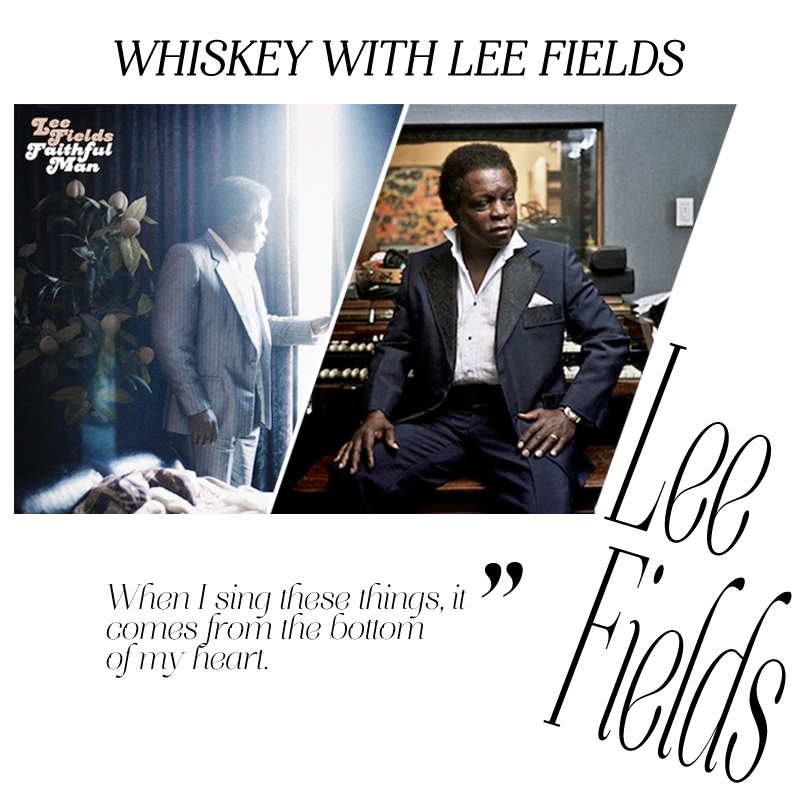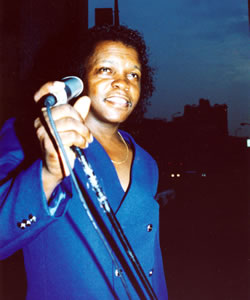[mp3j track=”Faithful-Man.mp3″]
BUY HERE
Lee Fields was cutting records before I was born, yet here I am sitting with the soul singer recounting decades of his musical career over a glass of whiskey backstage at Los Angeles’ Echoplex. Lee describes himself in the late 60’s as water. “I was totally refined. I was not diluted with anything other than an eager desire to perform.”
Watching his father as a seasonal worker, he had found something that he could go out on the weekends and do, and pay the mortgage for his mother. “I was a young kid running up and down the street…getting a view of the world the way it is.”
With stars in his eyes and 20 dollars in his pocket, Lee left North Carolina with his mother’s blessing and headed to New York City at the tender age of 17. “I met a guy down south that said ‘if you ever come to New York, look me up.'”
I was 17 and wild and crazy.
Not only did his acquaintance not know he was coming to the Big Apple to find him, he was getting married and moving away–the next day. But, Lee was a survivor, and he saw most every instance as an opportunity. Lee took over the apartment. He had no clue how he was going to pay the rent, but he stayed positive. At the wedding the next day, Lee was befriended by a guy named Lonny. The two extended the wedding party to some clubs around New York. Verbal about his aspirations, a certain club owner told him to take the stage and show everyone what he had. Lee did it happily. “They were throwing money at my feet. I mean, they were throwing money everywhere!” At the end of the night, Lee had $100 and rent for the next month.
Doors were open for Lee: he met Gene Redd, manager of Kool and the Gang. “Gene had a great idea to put me with Kool and the Gang,” he recalls. I fronted them for 6 months, but the public was buying them as a purely instrumental group, so Lee left. “When I left, I hated myself. I wondered what would’ve happened if I stuck it out.” Lee played it cool though, and decided to build up his own following. He cut a record called “Bewildered,” released in 1968. The track earned him and his band another crowd in parts of the south, and as he puts it,“all through the 70’s, everything was cool. ”
“When the 80’s came about, everything fell apart,” he remembers. Not only disco died. Soul went down with it. “The clubs I used to go to got shut down. Clubs were saying, ‘we don’t use bands anymore.’ I got down, but for some strange reason, I believe the worst of times bring on the best of opportunities.” He had to earn a living, so he read every book he could get on real estate, and said, “I can do this.”
He even tried opening up a fish eatery. “I had almost given up on my dream of singing, although I was doing records here and there. I said, ‘maybe that’s not for me, but the burning desire was still there.'”
Then, the 90’s happened. It was the era of the deejay, and what today’s youth now sees as normal. We see Grimes with a computer, beat box, and a microphone, or a giant mouse head bobbing over a computer screen and mixers, and see it as a perfectly viable form of live music. Lee, although confused and scared of what he calls “computer music” decided he could do this too. He began to integrate himself into this new world where technology and music merged, the world without a band, and a world in which soul music had not yet found a home. “I became vigilant. I watched. Watched the trends, watched music’s evolution, and of course, listened.”
Into the unknown, Lee went. “I decided to go out and buy some equipment. A Yamaha c-1 computer, a board, speakers, and a deck machine.” To his wife’s dismay, Lee sat in his basement and read for hours. For the genre of soul, using a drum machine was completely foreign. “The computer could play the drums for me!” he says with amazement still intact. He started making his own tracks. He said ‘goodbye’ to the live band, and hello to the 90’s.
Way ahead of this generation’s new age musicians, Lee played his tracks in clubs and sang to them like karaoke. “I brought a deck machine everywhere I sang.” People looked at him like he was crazy. Then, they listened. And then, he started to sell again. “The more tapes there were, the more they wanted. Regardless of how many tapes were made, they would sell.”
Success in the states grew to success abroad, and before he knew it, Lee had a following in both the States and Europe. “Everywhere I went was jam-packed.” Old soul came alive in a new way, and young talent wanted a piece of Lee too. French electronic DJ, Martin Solvieg (think, “Hello ft. Dragonette”) approached him for records. Lee did lead vocals for and toured with Martin for years, giving him hits like “Everybody,” Jealousy,” and “I Want You.” But it was Phillipe Lehman of Desco Records, Gabe Roth of Daptone Records, and Leon Michels of the Dap Kings (founder of Truth & Soul Records) saw an artist in Lee, convincing him to make My World. Now with his new album Faithful Man out, Lee Fields & The Expressions are playing soul as it should be. No drum machines, no decks, just the band. Lee managed to survive the death and revival of soul, keeping his cool the whole way.
“Now that I am with The Expressions, it’s the best time of my life. He repeats emphatically, “The best time of my life.”
BUY ‘Faithful Man’ HERE





